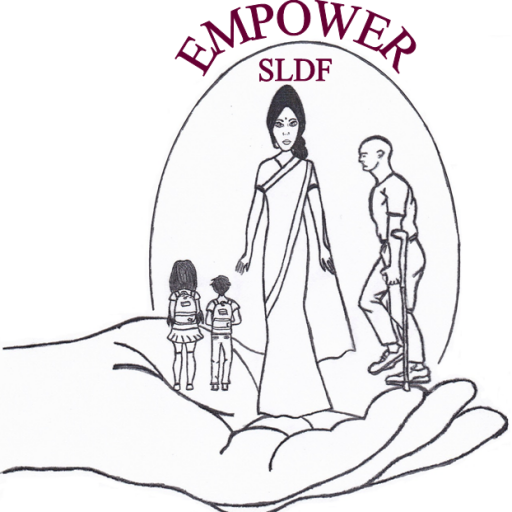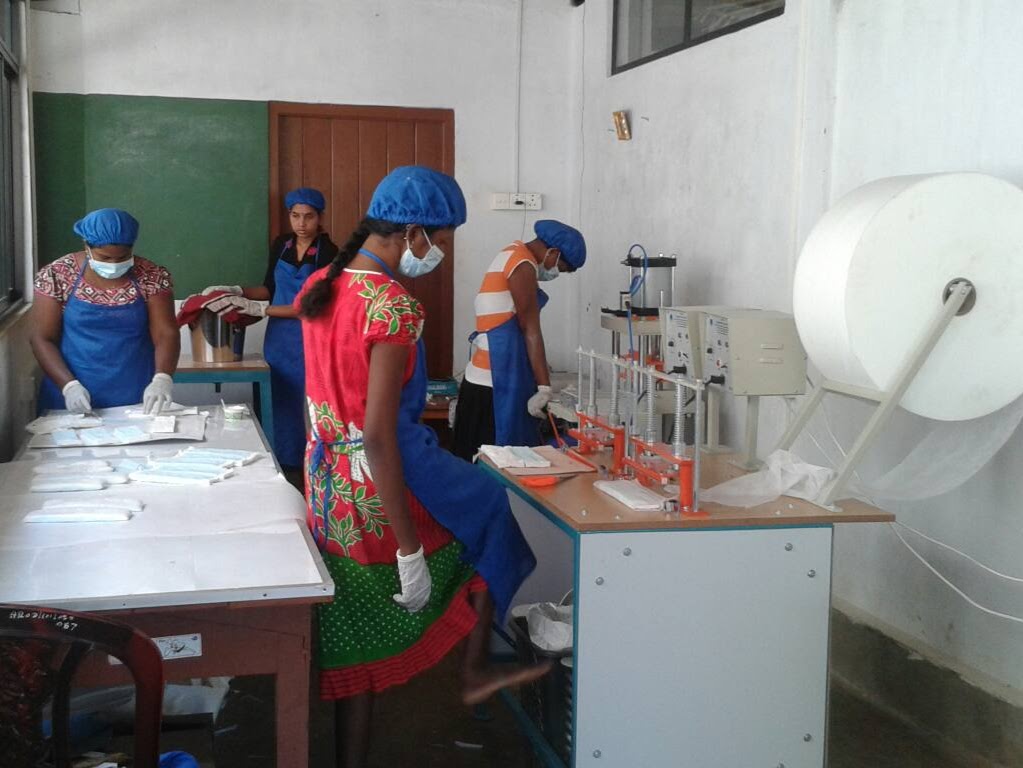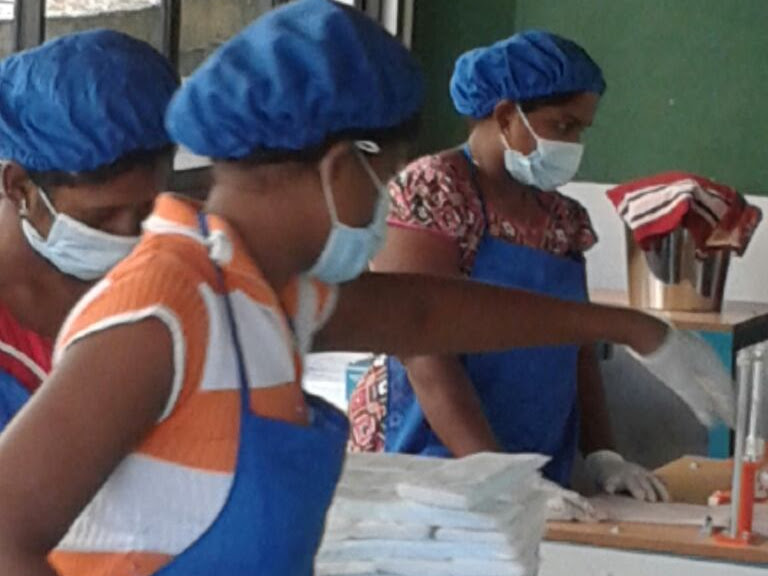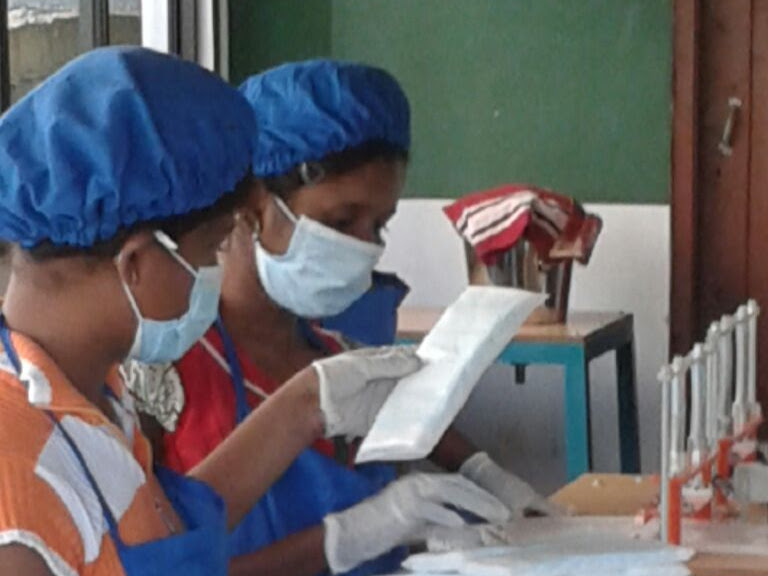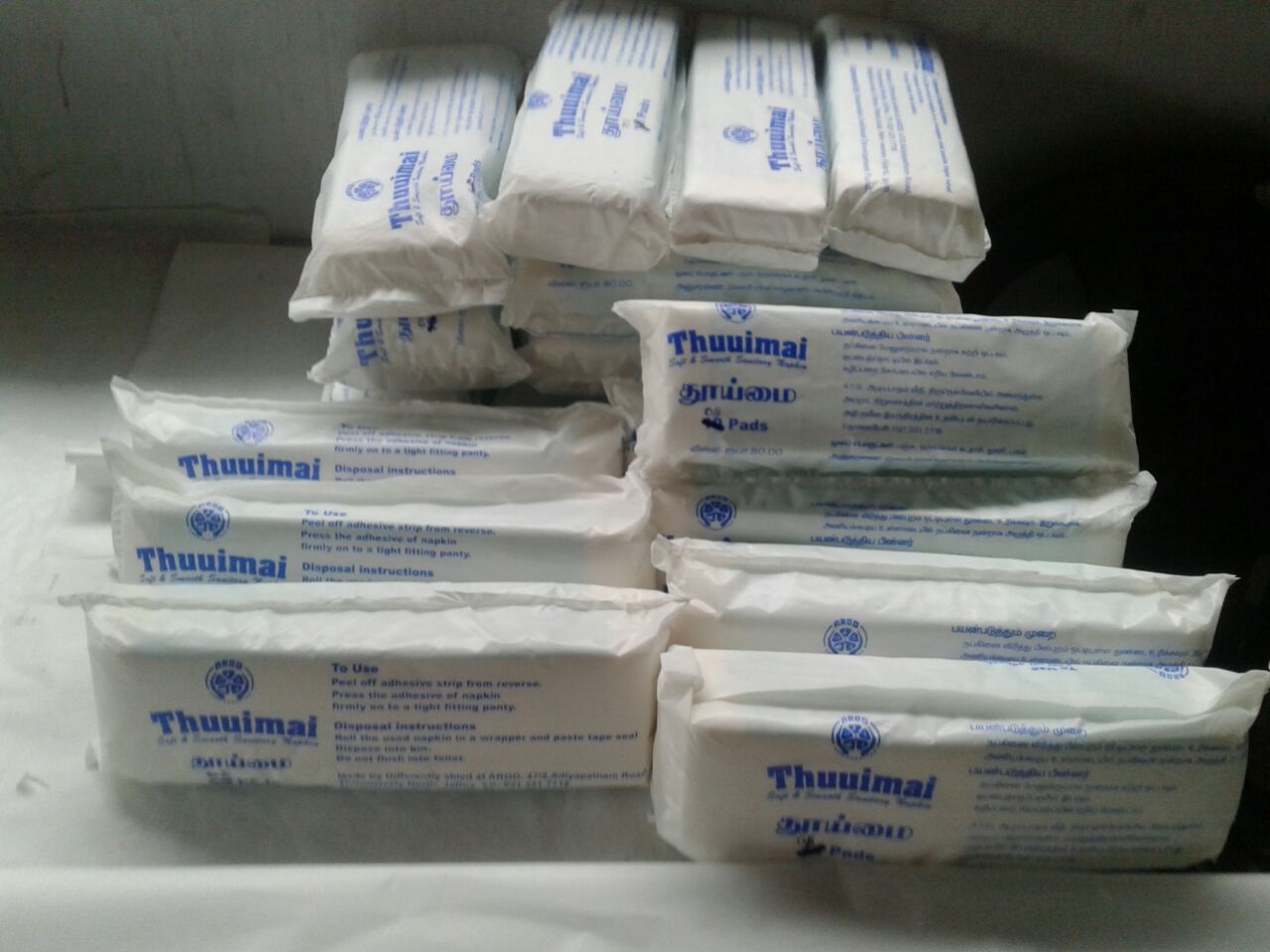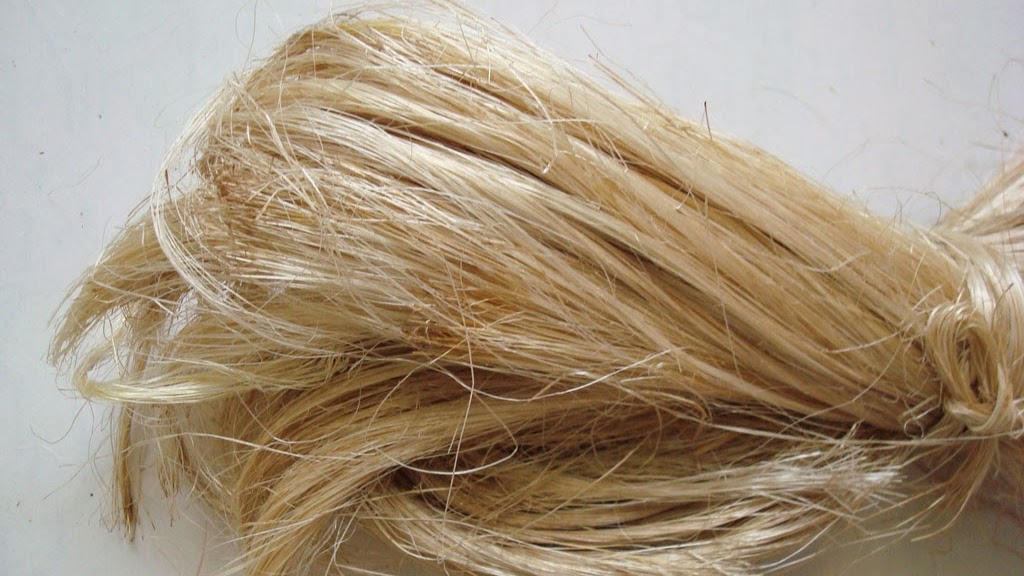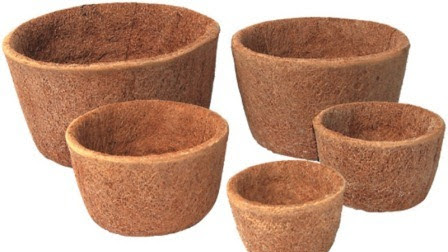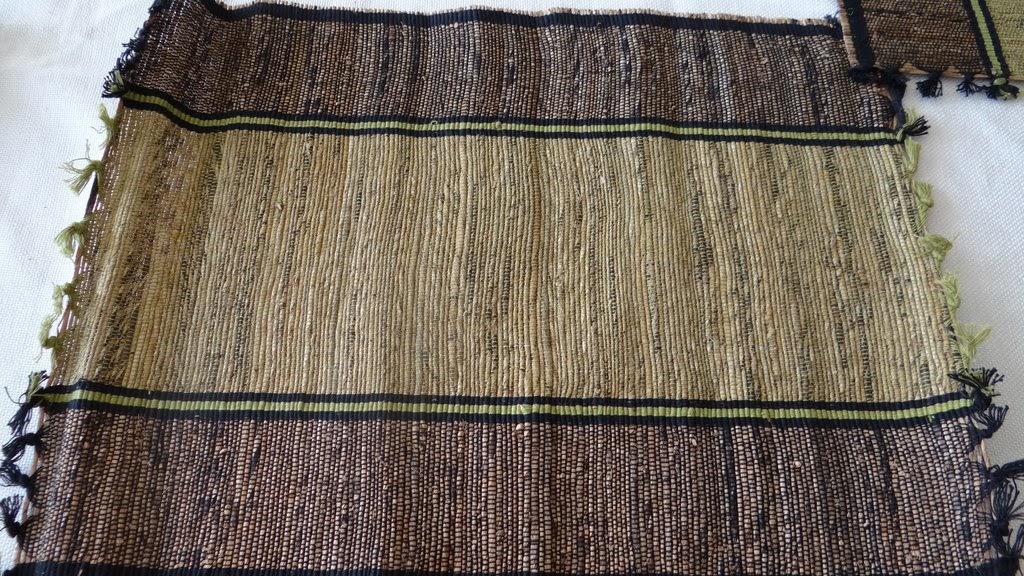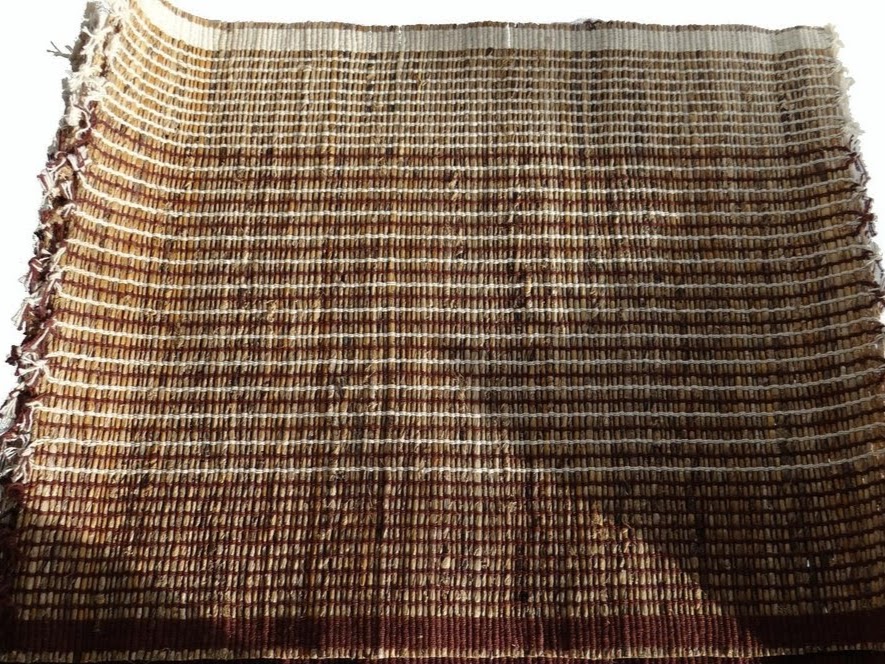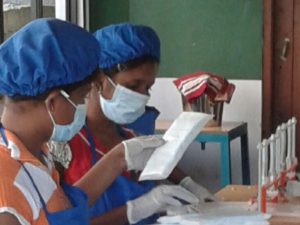
Hygienic Pads for Women for the Monthly Cycle
We had sponsored a young woman for training in sanitary napkin manufacturing in India and in 2017 funded the installation of the manufacturing unit at a local nonprofit organization in Thirunelvely, Jaffna. These low cost, hygienic, sanitary pads will give dignity to women in low income groups which will result in improved health outcomes over current unhygienic practices. A second manufacturing unit is planned for Mankulam.
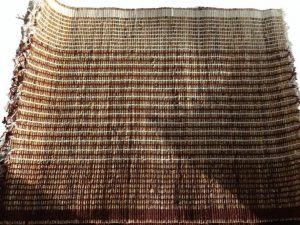
Banana Fiber Eco-Friendly Products
Taking advantage of readily available, discarded parts of the banana plants grown on plantations in the Northern Province, the SLDF will help individuals establish small enterprises in the manufacture of banana fiber textile products. The SLDF plans to send three women this summer to Trichy to be trained in banana fiber extraction and making eco-friendly products including textiles. Currently, the SLDF is seeking a facility to install the machinery and to extract the fibers.
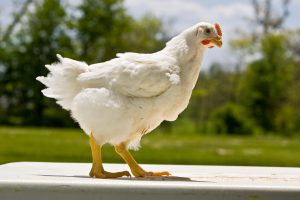
Poultry as a Small Market Entrepreneurship
We have funded twenty hens with poultry cage and a month of feed to women and war victims. Providing egg layers bring in revenue to the beneficiaries within a week. We will continue to provide poultry to needy women.
We have funded a poultry unit with 200 chickens in Kilinochchi which will also be a breeding stock to provide the necessary chickens to our beneficiaries.
Uni Technology
A joint venture in the technology front, born with the help of SLDF's outreach to the community. The entrepreneur already employ a local and plans to expand further as the product line volume increases.
Uni Technology Product Line
Dynamo Cellphone Charger
The Cell phone has become essential part of life in Sri Lanka. The usage, especially, North and East has seen exponential growth in the last decade, since the end of war. Its benefit is tied to livelihood in many fronts, creating opportunities and expanding reach.
However, one of the significant issue faced by mobile users, especially, those who depend on it for their livelihood, is the scarcity of options to charge the phones while on the move. Even when they are not mobile, the unexpected interruption of electricity can disrupt a thriving labor force who depend on it.
This need is widely felt. The SLDF came up with the Bike Dynamo Cell phone charging system. This solution not only addresses the need, it addresses it within the available means of life style in Srilanka.
The join venture initiation gave birth to Uni Technology, which jumped into action in producing a first protocol of a working model that had begun to circulate to select group of locals.
In this venture, while improving the lives of others, and employing destitute women, the Uni Technology entrepreneurs will be empowering themselves to become influential leaders of future.
A second branch of Uni Technology, will be spearheading another venture into manufacturing digital Microscope.
Digital (USB) Microscope Designing & Assembling
This type of devices very useful for school students, teachers, university students, university lecturers and doctors also.
Made of high quality mobile lense & IC and electronic components with clear image quality designed with 8 pieces of LED with variable intensity illumination.
It comes with a stand base to help keep the microsocoe in stability when in use. USB power supply compatible with most devices is to be utilized as power source.
There are several practical use for this tool and is projected to be very successful.
An emerging line of products that have born with the help of SLDF. Spearheaded by a graduate entrepreneur, it plans to employ more than seven destitute women and expand further as the business grow.
As a new concept to the community, Bavison Products is planning to home deliver its goods. An outcome of a market survey of this concept had been very encouraging.
Ventures of Bavisan Products
Mushroom Cultivation
At present it is a very productive enterprise. The Department of Agriculture has a huge interest and can directly purchase all the mushroom at the market value.
Organic Vegetables
Organic vegetable market share is gaining momentum in Sri Lanka as awareness of chemical fertilizers and pesticides are getting greater. One of the reason for this is the growing kidney diseases which is linked to the fertile land being contaminated with chemical fertilizers and pesticides as well as the drinking water system.
As part of this endeavor, the following vegetables are planned for cultivation: Bitter gourd, snake gourd, Lady’s finger, Brinjals, Beans etc. Organic materials will be used as fertilizers, along with traditional healthy methods used for pest control
Poultry
Cage-free chickens in the yard for eggs for food.
Flower Garden
Flowers plants and flowers have a decent market share as the community these are targeted for is religiously and ornamentally attached. As part of this venture, the flowers that are in demand are to be grown and marketed. Both Annuals and Perennials will make up the range of plants that are planned.
Broiler Chicken
Broiler chickens are being farmed for meat. These are in demand and easily marketable and profitable venture. The plan is to grow 200 broilers every 2 months.
Tilapia Farming
A backyard above-ground pool is planned to grow 100 to 125 tilapia. Tilapia is a freshwater fish that thrives in shallow ponds. It is relatively easy to raise, as it requires little space, hardy and disease-resistant. It grows and reproduces quickly, and can thrive in poor-quality water. As omnivores, this robust fish can live on anything from rice bran, to table scraps, to leaves, algae and insects. When provided with enough food, the fish can be harvested in as little as four months, or as soon as they reach a minimum of 350 grams.
An above ground pond, measuring 5 by 10 feet at a depth of two feet is large enough to house approximately 150 fish. Such a system is environmentally sound without damaging the ground. The waste water from the pond is considered highly fertile for agriculture.
Banana fiber extraction and manufacture of eco-friendly products
In Jaffna, farmers produced an estimated 27,000 metric tons of bananas in 2012, according to the District Secretariat. One acre of banana plantation generates approximately 1,000 to 1,500 stems annually, or approximately 100 - 150 kilograms of fibers. At present, the pseudo-stem, leaves and suckers of banana plants are thrown out after harvesting the fruit. Typically, planters employ laborers to remove the plant material, costing up to $150/ acre. They are usually dumped on the roadside or burnt by planters, causing a detrimental impact on the environment. By using the banana plant stems, as an abundance of raw material, many household goods are planned to be manufactured.
SLDF is proud to announce the birth of this third joint venture of 2018. Spearheaded by another graduate entrepreneur, this business plans to employ more than 15 destitute women.
Emerald Food Products
Spirulina cultivation
Mullaithivu distristic highly effected by war. Nutrient deficiency and unemployment are two of the heightened issues of the community. The Sprulina Project can overcome the people's nutrition deficiency problem. Emerald Foods planning to create awareness about the Sprulina (considered as a 'super food'). The sprulina can be an ultimate nutritional source for animals and will be marketed as such as well.
Initial cultivation will be marketed to the local community, which will eventually see its growth to the larger markets and eventually for export.
Tilapia Fish
Tilapia is to be grown as an organic food source, feeding with azola, spirulina, grain dust. The waste-cultured water will be used in the farming as it is nutritionally rich. In the initial phase, 4000 tilapias are to be grown ever 6 months. They will be marketed locally and as well as sold to the fisheries that transport it to the rest of Sri Lanka.
Organic Farming
Organic farming is planned with traditional methods without the use of pesticides, antibiotics, fertilizers, growth hormones and genetically modified organisms.
A six acre land is allocated for the planned organic farming. It will eventually employ more than 20 destitute women or individuals from these families.
Training in India: Manufacture of Sanitary Napkins
The SLDF sent one young woman to Coimbatore for training. The SLDF established a women-led business in Jaffna that manufactures and distributes low-cost, hygienic sanitary napkins. For logistical reasons the unit has been moved to Mankulam. The business employs local women while meeting a need for affordable feminine hygiene products in the region.
Mushroom Farm: Jaffna
In Jaffna, the SLDF has established a mushroom farm on the grounds of an orphanage in Jaffna that is home to 200 children. As in all SLDF projects, participants received training and technical support to learn to cultivate the mushrooms and manage the business.
School Stationary and Supplies: Vanni region
In the Vanni region, the SLDF has provided school stationery and supplies to more than 50 orphaned middle school children.
Horticulture for School Children: Kilinochchi
The SLDF has helped over 100 schools in the Kilinochchi area plant and maintain mango trees on school grounds, to educate children about horticulture and provide fresh fruit for their meals during the school day.
Support for Entrepreneurs: Jaffna and Vanni area
The SLDF has provided start-up materials, supplies, technical assistance and consultation to dozens of individual entrepreneurs. Examples include providing broiler chicks to bolster the business of a semi-blind war victim, and sesame seeds to promote the gingili oil trade of an amputee. Many women have received egg-laying hens, fishing nets, and other supplies to begin earning income through the SLDF’s initiatives.
Backyard Tilapia Farming: Jaffna and Vanni region
Since 2017 fall, the SLDF is working with St. Agnes Church in Mankulam and St John’s College to establish a model backyard tilapia farm that may generate income for members of the community. Tilapia ponds of this nature require minimal maintenance and offer a forgiving margin of error to those who are new to raising fish. NAQDA office in Kilinochchi is interested in establishing backyard fish farming.
Training in India: Beekeeping Training
The SLDF has sent two individuals from Jaffna to take part in apiculture (bee-keeping) training, a weeklong certification program, at the Tamil Nadu Agricultural University in Coimbatore during June 2017. The SLDF hopes place up to 100 hives with bee colonies at homes and fields across the Northern Province. Local residents will take responsibility for hosting the hives, and the two trained beekeepers will make monthly visits to each hive to extract the honey (mobile honey extraction; a new concept to Sri Lanka). For the mobile honey extraction, the SLDF is currently seeking donors to procure a suitable vehicle.
Training in India: Banana Fiber Textiles
Taking advantage of readily available, discarded parts of the banana plants grown on plantations in the Northern Province, the SLDF will help individuals establish small enterprises in the manufacture of banana fiber textile products. The SLDF plans to send three women this summer to Trichy to be trained in banana fiber extraction and making eco-friendly products including textiles. Currently, the SLDF is seeking a facility to install the machinery and to extract the fibers.
Business for Women Head of Family: Chavakachcheri
A well-wisher has facilitated a building in Chavakachcheri. Two women, head of the family are to be initiating mushroom farming in April/May 2018.
Training in India: Spirulina Cultivation
The SLDF is currently negotiating with a well-wisher in Jaffna area to start an organic model farm or set up Spirulina cultivation. Two or three women could be employed
Entrepreneur Challenge: North & Eastern Province
The SLDF launched a challenge competition to aspiring entrepreneurs to find a problem that is deeply rooted in the community and try to fix it by innovative means. In this initiative, winning ideas are to be awarded with funds and means to develop and bring them to market. Thus far, it has received quite a welcome from the audience it was open to. This challenge competition is to be launched twice a year, expanding to wider audience.
